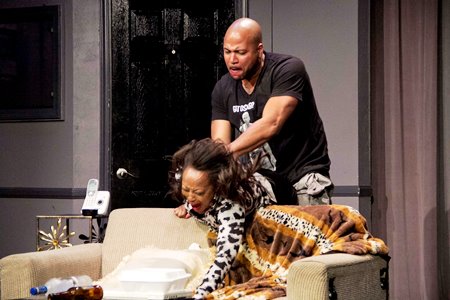
Physical acting is on display during the first act, as viewers witness the violent rape of Stacy Love by her husband. The Loves are played by Ptosha Story and Vincent Ward.

The abuser’s sister, played by Rhonda Morman, hopes to put a stop to the abuse, one way or another.
Courtesy Photos
As plays go, ‘The Conversation,’ by playwright Tasha Biltmore goes beyond just telling a story and providing entertainment, but makes a serious attempt to expose the reality that many people face when dealing with domestic violence. Told from the point of view of the abusive husband, this well written play exposes both the strengths as well as the weaknesses of those who commit such acts.
The main character, James Love, played by Vincent Ward, is an ex-NFL athlete who is struggling to get his life back on tract and return to professional sports. Through his attempts at seeking the right path, the play exposes all sides of those affected by domestic violence.
Aiding Love in his attempts to get his life together is his sister Amanda Love, played by Rhonda Morman. Decision making is a strong theme running throughout the play, and Amanda seeks to change her brother’s thinking and protect his wife, Stacy Love, played by Ptosha Storey, even going as far as matching her brother’s violence with her own pistol.
Represented in this play are the abused wife, the obsessed mistress, the best friend, the new boyfriend, and even the player seeking to capitalize off the loneliness of the abused. Together they weave a web of plotlines that attempt to describe the multifaceted realities faced by all of those involved in domestic violence.
Standouts in the play are the narrator, a young woman named Gwen Taylor, played by the talented Tiffany Denise, and James Love’s mistress, Rachel Voss, played by Tiffany Royale. Through a series of creatively written monologues, Taylor not only describes her own story of violence and abuse, but sets the stage for the viewer to understand the story of Love and his family. Voss gives us the other side of abuse, as a character who mentally and verbally abuses James Love, as well as delving into the mentality of the ‘side chick.’
With such a serious theme, there has to be a break from all that seriousness and sadness. These breaks come from the comic relief of the supporting characters. Leading the pack is radio personality Lisa Q, played by the fabulous Malika Blessing, who doubled as an actress and the Production Manager setting up and designing the stage for the production. Helping Lisa’s big voice are the stuttering player named Aviator, played by Antonio Ramirez, and the over sexed real estate agent and gossip hound Ms. Thomas, played by Raven Melinda.
“’The Conversation’ is an emotional play for me because I had to re-live so much of my past, in which I endured three bad relationships,” said writer and director Tasha Biltmore. “I have spent twenty years trying to diminish and let go of my past. Finally I had enough and stopped punishing myself for someone else’s sick behavior and I regained my power. I am not that broken woman anymore. ‘The Conversation’ has forced me to have conversations and share my painful story with others to let them see there is still a lot of healing, forgiveness, and accepting of life after the pain.”
Biltmore also runs the ‘Actor’s Playhouse Workshop,’ a free, weekly workshop designed to foster and cultivate beginning actors and actresses located in Maverick’s Flat on Crenshaw and Stocker. She plans on taking ‘The Conversation’ on a college tour to promote domestic violence advocacy on campuses.
Biltmore’s next production is an erotic stage play titled ‘Roxy.’ Roxy is set to premier June 19-20 at the Acme Comedy Theater on Labrea and Beverly. Biltmore promises that “this will be a Father’s Day that you won’t forget.”
For more information on ‘The Conversation,’ ‘Roxy,’ or Tasha Biltmore, go to www.facebook.com/tasha.biltmore.






